Google is a powerful search engine, but you must know how to search smart to find exactly what you want and not just search more. It could be tricky to find the exact information on Google, but fortunately, Google search operators offer a powerful solution. With the right special commands for Google, you can narrow your search, remove unwanted results, and go straight to the accurate information.
If you want to improve your search, competitor analysis, SEO audits, and so on, learning advanced search operators in Google is the right thing. It’ll greatly enhance your efficienc
In this blog, we’re highlighting the most valuable Google power search commands and showing how to use them by using practical examples. You’ll understand the mechanics behind advanced search operators in SEO, the logic behind the Google search syntax, and how to apply them in your SEO strategies. Whatever your experience level, beginner or expert, this comprehensive guide on Google operators will help you to fine-tune your techniques.
What are Google Search Operators?
In simple words, Google Search Operators (GSO) are special characters that are added to a search term to help you to get more refined results.
These are categorized as below:
- Punctuation-based Search Operators.
- Boolean Search Operators.
- Advanced Search Operators.
Here’s an all-inclusive Google search operators list:
1. To Search Internal Duplicate Content And Other Indexation Errors

The “site:” Google search syntax is best when you want to restrict the search results to a particular domain. It will display the multiple results available for that domain. This syntax works similarly to a normal Google search result and can be used to find link-building opportunities.
Used For:
- Searching internal duplicate content and other errors related to SEO.
- Searching link opportunities on a particular website.
Example: site:entrepreneur.com
2. To Search News Results From Certain Sources to Spice Up Your Content

It acts as a sister operator of a website. You can select a specific source in Google News.
Used For:
- Sourcing news pieces to reliable sites.
- Searching quotes and tidbits to make your content engaging.
Example: samsung source:mashable
3. To Search Pages That Contain Certain Keywords
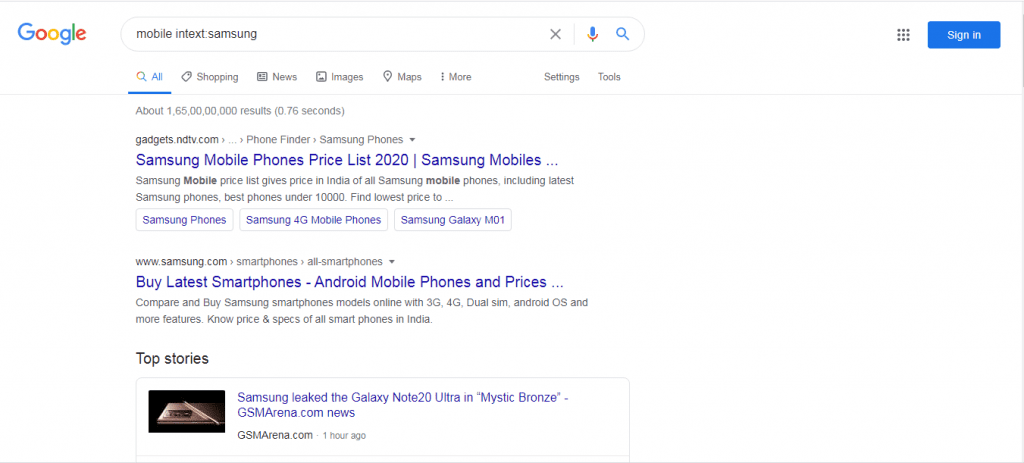
With Intext, you can find pages that contain a particular word somewhere in the content. In case the text appears in title and not the body, it won’t appear in the result. Virtually, it functions similar to normal Google result.
Used for:
- Searching text in the body of a web page.
Example: mobile intext:samsung
4. To Search Quotes and Force Accurate Results for Long-Tail Keywords

Basically it acts similar to “intext”, but you will see the result only when word in the query is in the body or else Google won’t include it in results.
Used for:
- Searching quotes.
- Forcing exact results for long tail results.
Example: allintext:samsung best phones
5. To Search Keywords in Page Tiles

When used to search a query it displays results where pages comprise of the search term in their meta title tag. With this Google operator, you can know the total number of web pages that target a specific search term.
Used for:
- Checking the level of keywords’ competitiveness.
- Searching backlink opportunities.
Example: intitle:samsung
6. To Search Direct Competitors
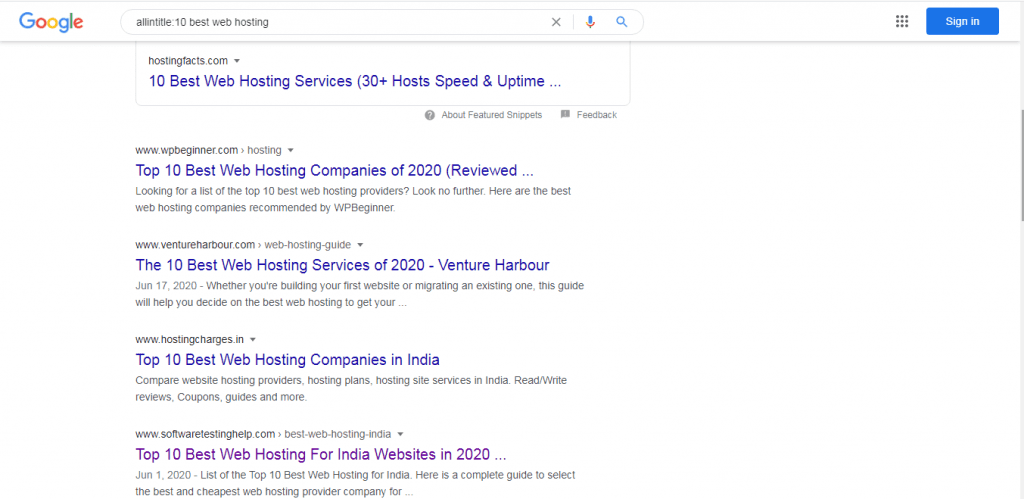
Almost functions same as Intitle, but each word in the query is present in the meta tag of the title of all results. Suppose you sold earphones on your ecommerce site, you can use this operator to check other websites that contain earphones in their titles. You can directly spot your competitors.
Used for:
- Searching direct competitors
- Determining the levels of content for a long-tail keyword.
Example: allintitle: 10 best web hosting
7. To Search Sites That Have a Specific Keyword In Their URL
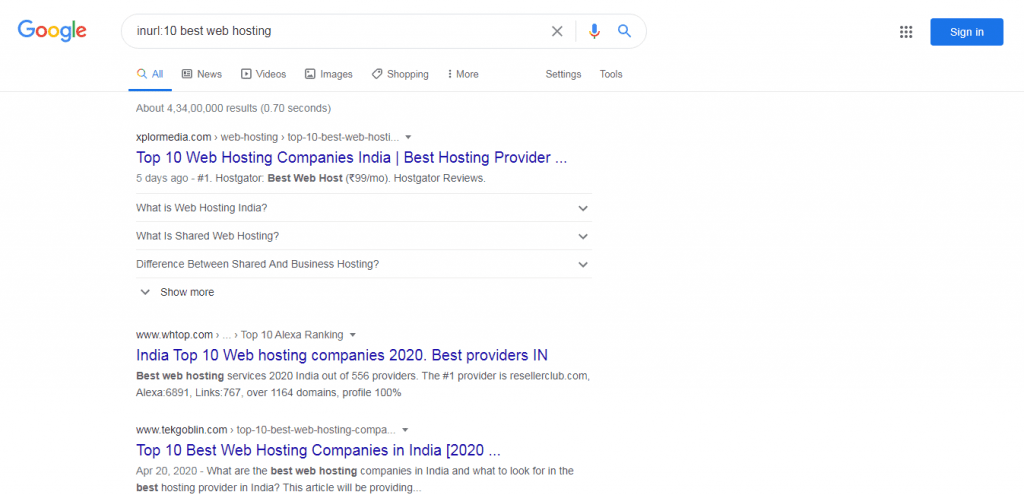
Similar to the advanced search operators in Google, like “Intitle” and “Intext,” it will return the page that contains the particular word(s) in the URL itself. Due to this, the search volume will get decreased and can be easy for finding potential direct competitors.
Used for:
- Searching direct competitors.
- Filtering out bad results.
- Searching backlink opportunities.
Example: inurl: 10 best web hosting
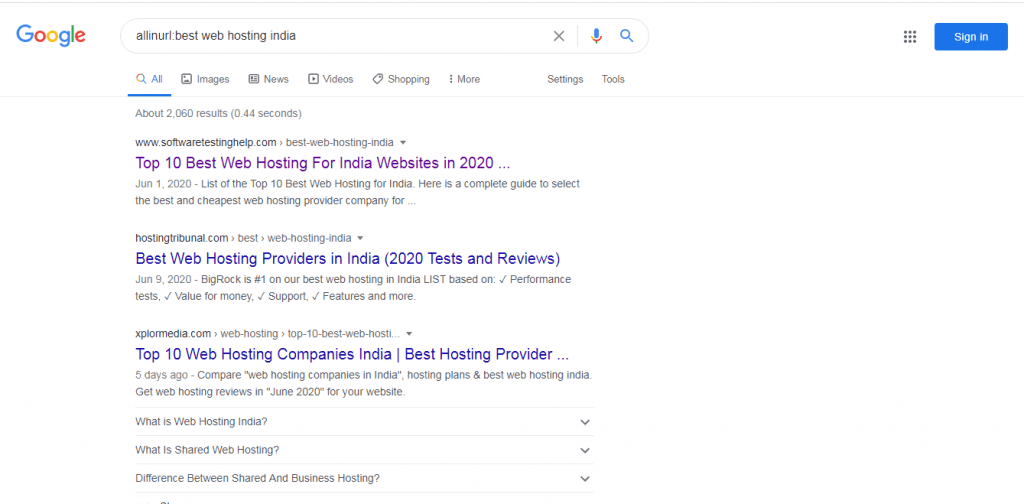
“Allinurl” is an advanced search operator in Google that continues to strengthen the “inurl” search operator, which returns results only when the URL contains all the words present in the query. If you use long search phrases, it mostly displays only a few or no results at all.
Used for:
- Filtering out bad results for popular topics.
Example: allinurl: best web hosting india
8. To Search Original Research, Statistics and Case Studies on a Certain Topic

It will display results of a specific type of file. “Filetype:” Google operator makes it easy for you to get the right results if you are searching for something related to research in the PDF format or any other file format, instead of HTML.
Used for:
- Finding original research, statistics and case studies on a certain topic quickly.
Example: web hosting filetype:pdf
9. To Search How Google is Categorizing Your Site

You can find sites related to a specified URL. When you use it, you will get an idea about the way Google categorizes your website and your competitors.
For instance, if we check the results for flipkart.com, you will see the usual SEO suspects along with some minor competitors for attention.
If you keenly check, Flipkart’s biggest competitor Amazon isn’t available, but there are some other competitors. So this means that Google understands the categorical hierarchy of SEO inside of online shopping.
Used for:
-
- Searching your competitors.
- Understanding the way Google is categorizing your site.
Example: related:amazon.in
10. To Search Words within X Words of Each Other
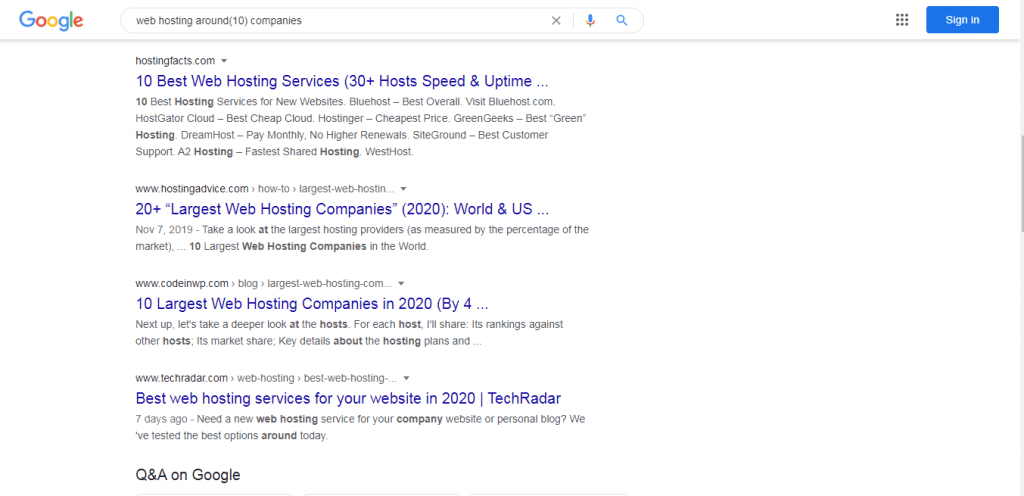
It displays the pages that include search words within X words of each other. It is used to search quotes and song lyrics that you don’t quite remember. The phrases that Google thinks you are looking for appear bold, along with the search words. (Note: It defines a range with a maximum number, not just the number).
Used for:
-
- Searching quotes that you unclearly remember.
- Searching official statements/case studies/research that contain a point you want to make.
Example: web hosting around(10) companies
Knowing how to use Google search operators is an essential skill that helps to make internet browsing and information extraction more effective. As an online marketer, a researcher, or a simple user, mastering these 18 powerful commands would give you precision and control over your search results.
It could also help you in filtering results based on dates or getting results from a certain type of file or a certain website. Try using them, and you’ll probably notice a difference in accuracy, relevance, and even efficiency.















